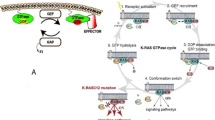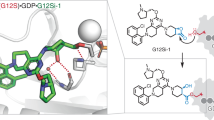Abstract
The non-steroidal anti-inflammatory drug sulindac is used in cancer prevention and therapy, but the molecular aspects of its anti-tumor effect remain unresolved. In vivo the prodrug sulindac, is converted into the metabolite sulindac sulfide. We found that sulindac sulfide strongly inhibits Ras induced malignant transformation and Ras/Raf dependent transactivation. Sulindac sulfide decreases the Ras induced activation of its main effector, the c-Raf-1 kinase. In vitro sulindac sulfide directly binds to the Ras gene product p21ras in a non-covalent manner. Moreover, we can show that sulindac sulfide inhibits the interaction of p21ras with the p21ras binding domain of the Raf protein. In addition, sulindac sulfide can impair the nucleotide exchange on p21ras by CDC25 as well as the acceleration of the p21ras GTPase reaction by p120GAP. Due to its action at the most critical site in Ras signaling we propose sulindac sulfide as a lead compound in the search for novel anti-cancer drugs which directly inhibit Ras mediated cell proliferation and malignant transformation.
Similar content being viewed by others
Author information
Authors and Affiliations
Rights and permissions
About this article
Cite this article
Herrmann, C., Block, C., Geisen, C. et al. Sulindac sulfide inhibits Ras signaling. Oncogene 17, 1769–1776 (1998). https://doi.org/10.1038/sj.onc.1202085
Received:
Accepted:
Published:
Issue Date:
DOI: https://doi.org/10.1038/sj.onc.1202085
- Springer Nature Limited
Keywords
This article is cited by
-
Small molecule inhibitors of RAS proteins with oncogenic mutations
Cancer and Metastasis Reviews (2020)
-
Inhibition of cyclooxygenase-2-mediated matriptase activation contributes to the suppression of prostate cancer cell motility and metastasis
Oncogene (2017)
-
Direct small-molecule inhibitors of KRAS: from structural insights to mechanism-based design
Nature Reviews Drug Discovery (2016)
-
Drugging the undruggable RAS: Mission Possible?
Nature Reviews Drug Discovery (2014)
-
Small-molecule modulation of Ras signaling
Nature Chemical Biology (2014)




